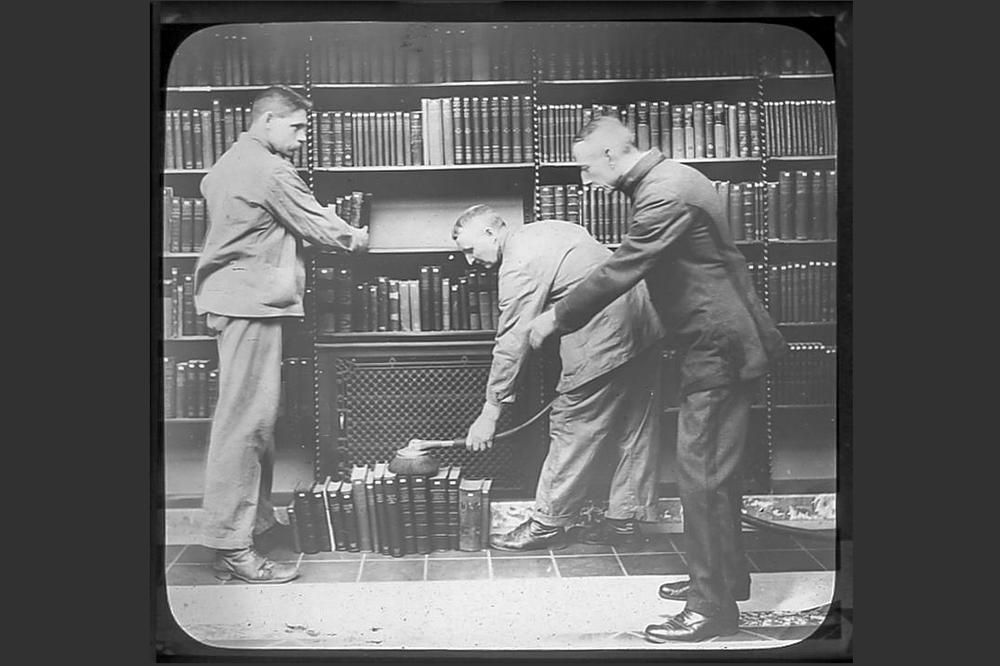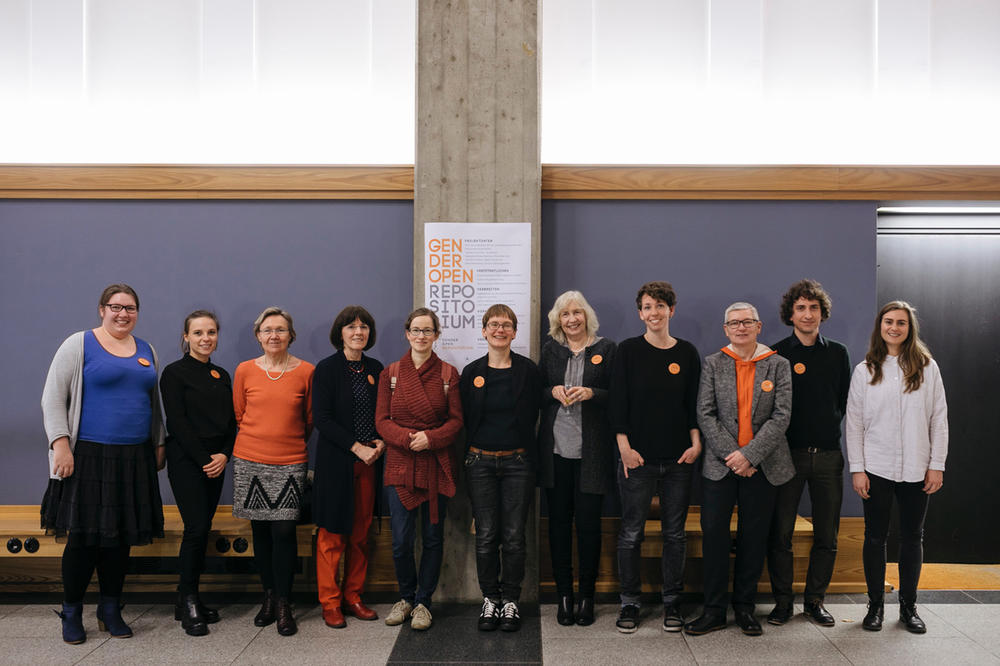Open Access for Gender Studies
The globally unique GenderOpen online repository of Freie Universität Berlin, Humboldt-Universität zu Berlin, and Technische Universität Berlin enables the results of gender research to be made freely accessible on the Internet.
Jul 23, 2018
2. Conventional repositories indexed documents and books and had to be revised regularly. Electronic repositories require powerful computer networks.
Image Credit: Three Men at Dusting Books, The New York Public Library Digital Collections
As late as 2012, scholars in gender studies were mostly critical of digital publishing and open access, i.e., publications that are freely available on the Internet. This was the result of a study on publication activities within gender studies funded by the German Research Foundation (DFG) between 2010 and 2012. This analysis became an incentive for a new project: “GenderOpen: A Repository for Gender Studies Research.” The aim was to create an electronic repository where gender research results are available as a secondary publication.
“I am convinced that the future belongs to open access and I wanted to help shape its development for gender studies,” says Anita Runge, a postdoctoral literature scholar who conducted the investigation into publication activities at the time. As gender studies still have problems with acceptance and many researchers feared that alternative publication channels outside of traditionally printed monographs and specialist journals by renowned publishing houses aren’t being perceived, “many researchers were afraid that, with Open Access, they would be twice whacking their own ball out of the court,” she states.
Anita Runge succeeded in getting two colleagues from Humboldt-Universität zu Berlin and Technische Universität Berlin to join her: Sabine Hark, sociology professor and head of the Center for Interdisciplinary Women’s and Gender Studies at Technische Universität Berlin, and Karin Aleksander, a philosopher, library scholar, and head of the library at the Center for Transdisciplinary Gender Studies at Humboldt-Universität zu Berlin. “I was immediately convinced of the task’s modernity,” says Karin Aleksander. “It is the world’s first repository for inter- and transdisciplinary gender studies.”
“The project brings different research communities together.”
Together, they developed the project proposal for GenderOpen - which was approved by the German Research Foundation in 2016. The project is receiving funds amounting to 500,000 euros over an initial two-year period. Until the electronic platform’s activation in December 2017, ten team members worked tirelessly from the start in October 2016: they raised interest in the project, solicited support, and dispelled reservations – in working groups, at librarian conferences and congresses, in the Open Access community, and in gender studies. “The project has also brought different scholarly communities together,” says Sabine Hark from Technische Universität. The members of the team developed the technical infrastructure, devised functionalities, and digitized content. In doing so, they were able to build on the long-standing strengths of each individual university: on Humboldt Universität’s expertise in librarianship and metadata, on Freie Universität’s experience gained in Open Access and the promotion of gender studies’ publications, and on Technische Universität’s research into the institutional situation of gender studies.
1. The GenderOpen team (from left to right): Eva-Lotte Rother, Sarah Staeck, Dr. Agnes Mühlmeyer-Mentzel, Dr. Karin Aleksander, Dr. Marianne Seidig, Dr. Aline Oloff, Dr. Anita Runge, Mareike Trawnik, Prof. Dr. Sabine Hark, Andreas Heinrich, Sophie Ei
Image Credit: TU Berlin / Alexander Rentsch
In acquiring the content, the project team took two paths right from the start. “We are negotiating with publishing houses on bundles of journals,” explains Anita Runge. “And we approached important older researchers of this field, asking them to publish their life’s work and function as the project’s ambassadors.” Sabine Hark emphasizes the great challenge of finding a legally robust solution for everyone involved – for the repository, for the publishing houses and for the authors themselves. With this project, the team hopes to influence the way gender research is conducted in the long term, says Karin Aleksander. Already today, digital publications are blurring the boundaries of traditional library catalogs; in the future, more and more community-specific research tools will be created and the inter-/transdisciplinary character of research topics will become clearer if they are indexed with coordinated search words, predicts Karin Aleksander. In addition, researchers are to be persuaded to plan their media’s secondary publication right from the outset themselves. Sabine Hark has no doubt: “The repository makes it easier to find texts on gender studies because it digitally brings collections together that are often scattered across traditional subjects in analog libraries.” Moreover, articles from anthologies and many journals have not yet been recorded and indexed as document types, which the repository is offering for the first time,” emphasizes Karin Aleksander.
“Finding texts on gender research is made easier.”
According to the project leaders’ assessment, the development of technical, legal, and substantive fundamentals that could be useful and serve as role models for other Open Access projects and journals on gender studies has generally been successful. “We have legal and technical standards that most other digital repositories don’t meet,” Sabine Hark emphasizes. In addition to the repository’s core business, the developed legally watertight and comprehensible legal regulations have also been made freely available in open access. Furthermore, when uploading, a keyword list of about 500 terms offers the first-time possibility of recording the contents of one’s own article in a standardized way. In the future, these experiences can be used for new research tools, such as the development of a thesaurus for gender studies.
In the repository, about 400 articles are now available in open access. Many others have already been made available in digital versions by publishing houses and can be uploaded and activated if the authors’ have given their consent. These include large convolutes: for example, the repository contains all the essays by “FEMINA POLITICA, Zeitschrift für Feministische Politikwissenschaft” and the complete volumes of “feministische studien” published since 1982. Currently, it mainly includes articles and monographs that have already been published, as well as primary publications of dissertations or habilitation theses. For other types of documents, such as project reports, expert reports from ministries, or archive documents, for example, suitable submission routines will be developed in the course of the project.
“The repository also raises new questions on research ethics and technology.”
The long-term goal is to sustainably secure the results of gender studies of the last 50 years and make them freely available for research and teaching. In the future, not only the research results should be accessible in open access, but also the underlying research data, for example, interviews or surveys. “This implicates new challenges in terms of research ethics and technology,” explains Anita Runge. “Personal rights must be strictly respected; new technical solutions are needed for multimedia content.”
With the aim of modernizing publication practices in gender studies, a further project was launched in June 2018: the “Open Gender Platform,” which is intended to provide space for the primary publication of articles in journals. The project is led by Anita Runge at Freie Universität’s Margherita von Brentano Center for Gender Studies and funded with nearly 275,000 euros by the German Federal Ministry of Education and Research over a two-year period. The open access concepts for gender studies developed within the framework of GenderOpen will also be significant for the new project. And, due to the successful cooperation of the GenderOpen project team at the three Berlin universities, there may be less skepticism and reservations among future authors about their primary publications.


